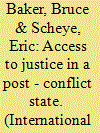| Srl | Item |
| 1 |
ID:
087826


|
|
|
|
|
| Publication |
2009.
|
| Summary/Abstract |
Post-conflict governments and donors prioritize rebuilding the justice sector through state delivered rule of law and access to justice programmes. Misunderstanding the nature of the post-colonial state, such programmes make questionable assumptions. First, that a lack of access to state justice is the same as an overall absence of justice. Second, that the state system that is being built is what people want. Third, that the state system of justice that is being built could provide a sustainable nationwide network in the foreseeable future. Based on interviews conducted with policy designers, practitioners, local people and chiefs at three sites in southern Sudan 2007, this article calls for a rethinking of donor-supported justice and police development and advocates an approach that recognizes the importance of local justice.
|
|
|
|
|
|
|
|
|
|
|
|
|
|
|
|
| 2 |
ID:
145110


|
|
|
|
|
| Summary/Abstract |
Reactions to the promotion of human rights norms in post-conflict countries often clash with central assumptions of established theoretical approaches to norm diffusion. Socialization scholars expect either resistance when strong veto players are present and when resonance is missing, or extensive adoption of norms when states are vulnerable to transnational advocacy. Others predict decoupling processes when local capacities for implementation are scarce. Research on norm localization, in contrast, foresees the reinterpretation and modification of norms. The concept of localization, however, is often used as a catch-all category. Based on a new three-step model of translation into discourse, law, and implementation, I distinguish different types of translation. This conceptual approach to norm translation gives an interactional account of how certain types of translation emerge and shows the limits of “cures” for missing compliance proposed in existing approaches. The discussion draws on examples of human rights promotion in post-conflict Guatemala.
|
|
|
|
|
|
|
|
|
|
|
|
|
|
|
|